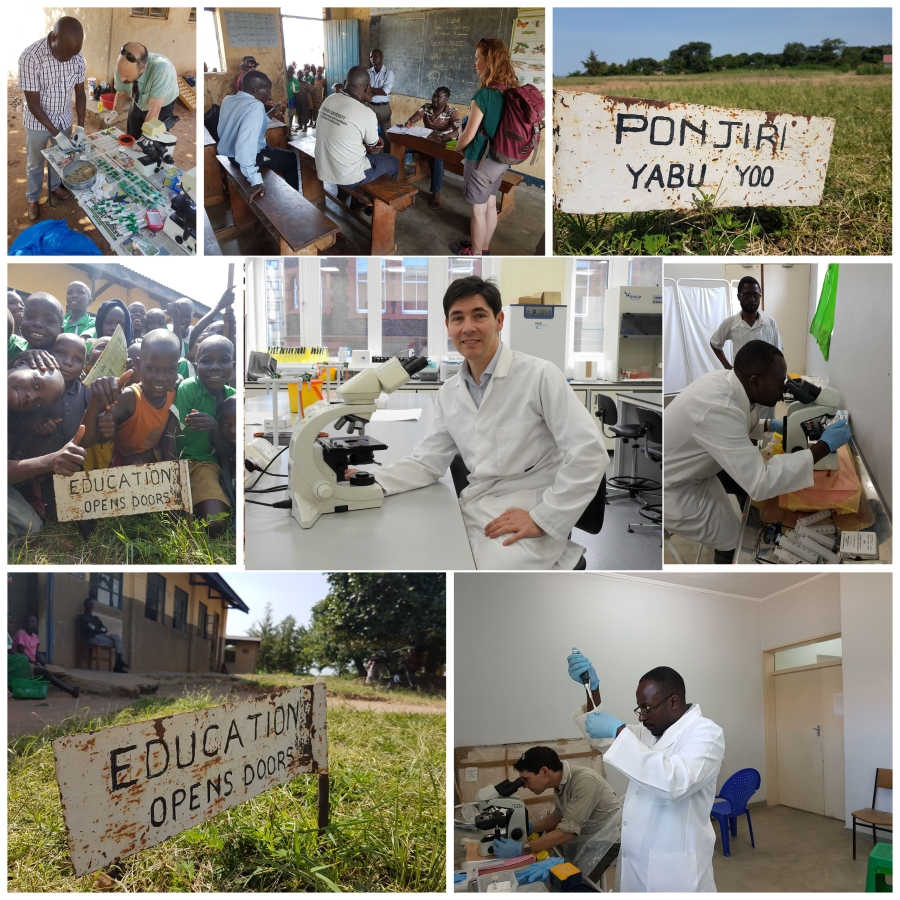
Shall I wipe a bit of poo on it? It’s what it’s usually covered in!” jokes the photographer’s subject, referring to his currently spotless lab coat. It’s an unusual start to an interview but then James LaCourse does not do what most people would call a normal job. Yes, he is a lecturer and Director of Studies for both of LSTM’s master’s courses in tropical disease biology, but he also spends a fair amount of time looking down a microscope at stool samples.
James came to LSTM in 2010 to take up the post of Lecturer in Parasitology. This was a period when LSTM was striving to achieve independent institution status and shifting from being almost entirely research focused to seeing teaching as a core objective. “There is a great deal of expertise here and it was, and still is, essential for us to make it transferable to students, both here and in the tropics.”
Today, about 80% of James’ time is spent teaching with the rest given to research ( “I couldn’t do just research – I’d become grey and boring.”) Much of that research is through the students’ research projects although he is also involved in work with colleagues from both LSTM and other institutions. James’ focus is largely upon disease-causing parasitic worms which infect billions of people and animals worldwide. These often-neglected worm diseases can be devastatingly life-changing, and disproportionally affect people living in the world’s poorest regions.
“There’s no average day for me ”, James explains. “ I’ve gone from chairing a board of studies in snowy Liverpool, to next day finding myself in baking heat in rural Uganda looking down a microscope. One of the reasons I love this job is because there is so much diversity.”
The students on the master’s courses are similarly diverse, coming from a range of backgrounds, but James is sure about why they are all attracted to LSTM. “ The jewel in the crown of a lot of the education here is the fact that we take our students overseas. A great deal of our students come here specifically because they get opportunities to work in tropical regions. It’s being able to go out and see the challenges in the real world – there’s nothing like it. Field work transforms people’s careers and their view of those problems.”
James is also certain that the School’s research is essential in the classroom. “ LSTM is famous for really pushing the boundaries in research which is then transferred back into our teaching. Our students can get involved in, and hear about, the latest research developments ‘hot off the press’; in many cases before it’s even been published.”
The environment James describes is a very dynamic one, where both student and lecturer are challenged to stay at the cutting-edge. “ Everything is constantly changing. Climate change, civil unrest, natural disasters etc affect resource-poor areas of the tropics and interventions change the prevalence and intensity of disease. We can’t roll out the same lectures each year - our teaching must respond to those evolving challenges. Our students must be ready to work in those areas and in labs, so we have to keep on our toes.”
The opportunities afforded by new technologies are also changing teaching and encouraging lecturers like James to reflect on their own, as well as their students’ performances. “ It’s not just what we teach but also how we teach it. For instance, we’re looking at using video links to contact students and field workers in hard to reach areas - live feeds from the field. In the classroom we are using anonymous mobile response software to test learning which has really made us think about how we teach, making us better teachers and improving students’ results. We also try to make learning fun - I’ve even worn a poo emoji hat as part of a teaching evaluation.”
So, given that this is an ever-changing field, how does James see his courses and research developing in the coming years? Unsurprisingly, given its coverage in the press, anti-microbial and insecticide resistance are hot topics. “ A great deal of our research will continue to be pushed in these directions. However, lab work is not enough – we need to communicate this work and educate people as to the dangers. ” James explains, “ Many of the fantastic gains we’ve made in tackling diseases have been driven by chemotherapy but we rely on very few drugs and need to ensure there are new drugs in the pipeline alongside better diagnostics. We need to up our game – this is an ‘arms race’ between the parasites, the vectors and us - we need to stay ahead.”
When asked about his favourite aspect of the job, James’ answer in unequivocal. “ The interaction with students - in the lab, in the field and in lecture theatres. They can be great fun. Sometimes we underestimate what students are already capable of, but if we pose them a problem and allow them the flexibility to solve it we can be taken by surprise. Students amaze us! They bring an infectious enthusiasm (pun intended), year after year, that keeps everyone going. It’s easy to get up in the morning to come to work when you have that. ”